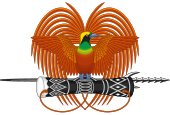
The politics of Papua New Guinea takes place in a framework of a parliamentary representative democratic multi-party system, whereby the prime minister is the head of government. Papua New Guinea is an independent Commonwealth realm, with the monarch serving as head of state and a governor-general, nominated by the National Parliament, serving as their representative. Executive power is exercised by the government. Legislative power is vested in both the government and parliament.

Sir Julius Chan is a Papua New Guinean politician who served as Prime Minister of Papua New Guinea from 1980 to 1982 and from 1994 to 1997. He is Member of Parliament for New Ireland Province, having won the seat in the 2007 national election. He is also the current Governor of New Ireland Province, since 2007. On 26 May 2019, Prime Minister Peter O'Neill announced he would soon resign and that he wished for Sir Julius to succeed him. An outgoing Prime Minister does not, however, have the power to appoint his successor, and the following day O'Neill delayed his own formal resignation. He was also a leading figure in his country during the years-long Bougainville conflict.
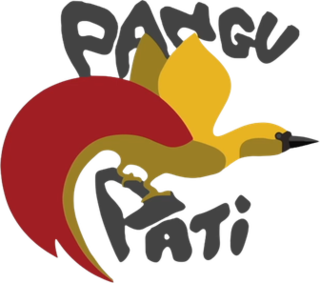
The Pangu Pati, officially Papua na Niugini Yunion Pati, is a nationalist and developmentalist political party on the centre-left in Papua New Guinea.The party is the oldest political party in Papua New Guinea and has held all levels of government throughout its history. As of 2023, it is the largest party in the National Parliament.
Jeffery Nape was, until the 2012 election, speaker of the National Parliament and twice officially and once unofficially acting governor-general of Papua New Guinea. He was elected speaker by the members of the parliament on 28 May 2004, and then immediately became acting governor-general because that office was substantively vacant. He succeeded Bill Skate in both roles.

The People's National Congress is a political party in Papua New Guinea. Its former leader Bill Skate served as Prime Minister from 1997 to 1999 and as speaker of Parliament from 2002 to 2004. Skate died in 2006 and the party was led by Peter O'Neill until 2022. PNC originated from the National Capital District where former leader was the Governor of NCD and the Parliamentary Member. The party had 16 members in the 113-seat National Parliament of Papua New Guinea as of December 2022.
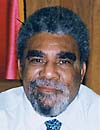
Sir Mekere Morauta was a Papua New Guinean politician and economist who served as the 7th Prime Minister of Papua New Guinea from 1999 to 2002. Inheriting a depressed economy and a fractious legislature, he embarked on fundamental reforms of the country's economy and political system.

General elections were held in Papua New Guinea from 30 June 2007 to 14 July 2007.

Sir Michael Thomas Somare was a Papua New Guinean politician. Widely called the "father of the nation", he was the first Prime Minister after independence. At the time of his death, Somare was also the longest-serving prime minister, having been in office for 17 years over three separate terms: from 1975 to 1980; from 1982 to 1985; and from 2002 to 2011. His political career spanned from 1968 until his retirement in 2017. Besides serving as PM, he was minister of foreign affairs, leader of the opposition and governor of East Sepik Province.

Don Pomb Polye is a Papua New Guinean politician from Enga Province. He has been a Cabinet Minister under two Prime Ministers, and was briefly Deputy Prime Minister from July to December 2010. He has held Foreign Affairs, Immigration, Transport, Civil Aviation, Finance and Treasury portfolios.

James Marape is a Papua New Guinean politician who has served as the prime minister of Papua New Guinea since May 2019. He has been a member of the National Parliament of Papua New Guinea since July 2007, representing the electorate of Tari-Pori Open in Hela Province in the highlands. He has held Cabinet Posts as Minister of Education (2008–2011), Minister of Finance (2012–2019), and Minister of Foreign Affairs (2023–present). Marape entered the 2022 elections under the banner of Pangu Party and won more seats than any other party. He was therefore entitled to form the government. His new government was elected unopposed by the new parliament.
The Papua New Guinea Labour Party was a political party in Papua New Guinea.

Sir Arnold Amet is a Papua New Guinean former politician and judge. He was a member of the National Parliament of Papua New Guinea from 2007 to 2012, representing the Madang Provincial seat. He was Minister for Justice and Attorney-General from 2010 to 2011. Prior to entering politics, he was Chief Justice of Papua New Guinea. In February 2021 he was nominated as the Allegiance Party candidate for the seat of Moresby North West District but was unsuccessful in securing the seat. He was awarded Knight Bachelor for service to the judiciary, law and justice in 1993.

Sir Puka Temu,, is a Papua New Guinean politician. He has been a member of the National Parliament of Papua New Guinea since 2002, representing the electorate of Abau Open. A former Deputy Prime Minister under Michael Somare, he is part of Prime Minister James Marape's government as a member of the Our Development Party.
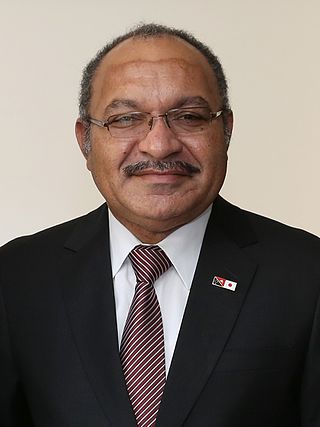
Peter Charles Paire O'Neill is a Papua New Guinean politician who served as the seventh Prime Minister of Papua New Guinea from 2011 to 2019. He has been a Member of Parliament for Ialibu-Pangia since 2002. He was a former cabinet minister and the leader of the People's National Congress between 2006 and 2022. He resigned his position as prime minister to avoid a vote of no confidence, and he was succeeded by James Marape. O'Neill won re-election to the National Parliament of Papua New Guinea in 2022 in the first round with a large majority, which is unusual in the country.
2011–2012 Papua New Guinean constitutional crisis was a dispute between Sir Michael Somare and Peter O'Neill. Both claimed to be Prime Minister of Papua New Guinea.

General elections were held in Papua New Guinea from 23 June until around 13 July 2012, after being postponed by a further week to allow for security personnel to criss-cross the country, particularly the highland provinces. The elections followed controversy over incomplete electoral rolls and a constitutional crisis caused by a dispute over the office of prime minister between Michael Somare and Peter O'Neill.

Samuel H. Basil was a Papua New Guinean politician. He was a member of the National Parliament of Papua New Guinea from 2007, representing the electorate of Bulolo Open, until his death in 2022. From 8 June 2019, to August 2019 Basil served as the Treasurer of Papua New Guinea.
Patrick Pruaitch, CMG is a Papua New Guinea politician who represented the Aitape-Lumi constituency in the West Sepik Province of Papua New Guinea in the National Parliament of Papua New Guinea from 2002 to 2022. He was a Cabinet Minister with few interruptions from 2002–2010 and from 2012–2017. From November 2019–November 2020, he was Minister for Foreign Affairs. From 2017–2019 and 2020-2022 he was Leader of the Opposition. He was twice – in 2019 and 2020 – alternate PM in unsuccessful attempts to unseat the government.

General elections were held in the Territory of Papua and New Guinea between 19 February and 11 March 1972. They saw the election of the country's first female MP, Josephine Abaijah.
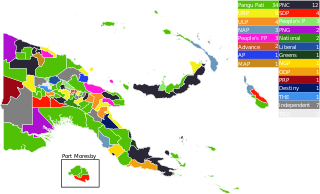
General elections were held in Papua New Guinea from 4 to 22 July 2022 to elect the members of the National Parliament for a new five-year term.
